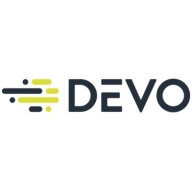

IBM Security QRadar and Devo are prominent competitors in the SIEM market, each offering unique strengths. IBM Security QRadar excels in built-in security intelligence, while Devo holds an upper hand with its advanced data visualization and multi-tenancy features.
Features: IBM Security QRadar's standout features include its ability to extract information from raw logs, comprehensive threat protection, and built-in correlation rules that enhance real-time threat detection. On the other hand, Devo's highlights include its Activeboards for effortless data visualization and support for multi-tenant environments, helping ensure compliance without data isolation issues. Both solutions offer scalability, but QRadar particularly emphasizes security intelligence, while Devo focuses on intuitive visual analytics.
Room for Improvement: QRadar could benefit from enhanced graphical analytics, better API support, and improvements in integration with other IBM security platforms. Customization and vulnerability scanner accuracy also need attention. Devo, meanwhile, could enhance visual analytics in its Activeboards and extend third-party integrations. A more robust detection suite and streamlined user interface would help it stand out further.
Ease of Deployment and Customer Service: QRadar offers flexible deployment options, including hybrid cloud environments, though user experiences with technical support vary by region. Devo is appreciated for its straightforward, cloud-native architecture and deployment settings. However, both solutions have mixed customer service ratings, with QRadar facing potential delays in support escalation.
Pricing and ROI: QRadar's event-per-second-based licensing is seen as complex and costly, yet many value its security benefits. Devo, employing a gigabyte-based pricing model, offers a transparent and competitive pricing structure, though metadata charges contribute to higher upfront costs. Despite this, Devo's clear pricing makes it appealing for budget-conscious enterprises. Both solutions are noted for delivering solid ROI, with Devo particularly favored for its predictability in cost management.


Devo is the only cloud-native logging and security analytics platform that releases the full potential of all your data to empower bold, confident action when it matters most. Only the Devo platform delivers the powerful combination of real-time visibility, high-performance analytics, scalability, multitenancy, and low TCO crucial for monitoring and securing business operations as enterprises accelerate their shift to the cloud.
IBM Security QRadar (recently acquired by Palo Alto Networks) is a security and analytics platform designed to defend against threats and scale security operations. This is done through integrated visibility, investigation, detection, and response. QRadar empowers security groups with actionable insights into high-priority threats by providing visibility into enterprise security data. Through centralized visibility, security teams and analysts can determine their security stance, which areas pose a potential threat, and which areas are critical. This will help streamline workflows by eliminating the need to pivot between tools.
IBM Security QRadar is built to address a wide range of security issues and can be easily scaled with minimal customization effort required. As data is ingested, QRadar administers automated, real-time security intelligence to swiftly and precisely discover and prioritize threats. The platform will issue alerts with actionable, rich context into developing threats. Security teams and analysts can then rapidly respond to minimize the attackers' strike. The solution will provide a complete view of activity in both cloud-based and on-premise environments as a large amount of data is ingested throughout the enterprise. Additionally, QRadar’s anomaly detection intelligence enables security teams to identify any user behavior changes that could be indicators of potential threats.
IBM QRadar Log Manager
To better help organizations protect themselves against potential security threats, attacks, and breaches, IBM QRadar Log Manager gathers, analyzes, preserves, and reports on security log events using QRadar Sense Analytics. All operating systems and applications, servers, devices, and applications are converted into searchable and actionable intelligent data. QRadar Log Manager then helps organizations meet compliance reporting and monitoring requirements, which can be further upgraded to QRadar SIEM for a more superior level of threat protection.
Some of QRadar Log Manager’s key features include:
Reviews from Real Users
IBM Security QRadar is a solution of choice among users because it provides a complete solution for security teams by integrating network analysis, log management, user behavior analytics, threat intelligence, and AI-powered investigations into a single solution. Users particularly like having a single window into their network and its ability to be used for larger enterprises.
Simon T., a cyber security services operations manager at an aerospace/defense firm, notes, "The most valuable thing about QRadar is that you have a single window into your network, SIEM, network flows, and risk management of your assets. If you use Splunk, for instance, then you still need a full packet capture solution, whereas the full packet capture solution is integrated within QRadar. Its application ecosystem makes it very powerful in terms of doing analysis."
A management executive at a security firm says, "What we like about QRadar and the models that IBM has, is it can go from a small-to-medium enterprise to a larger organization, and it gives you the same value."
We monitor all Security Information and Event Management (SIEM) reviews to prevent fraudulent reviews and keep review quality high. We do not post reviews by company employees or direct competitors. We validate each review for authenticity via cross-reference with LinkedIn, and personal follow-up with the reviewer when necessary.